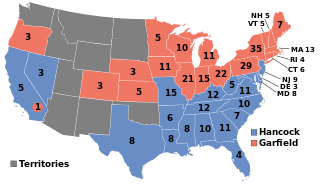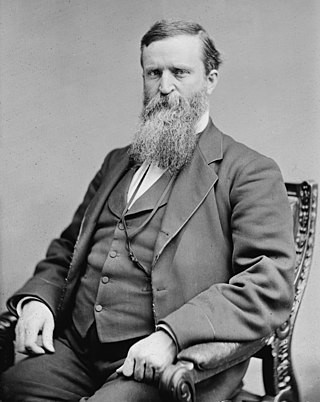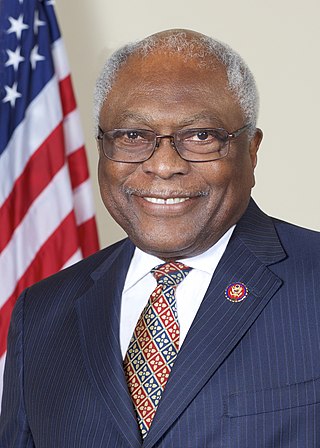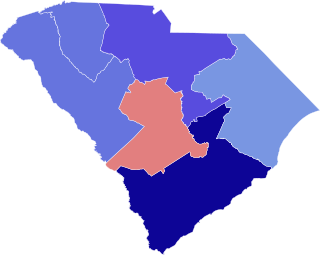
The 1880 United States presidential election was the 24th quadrennial presidential election, held on Tuesday, November 2, 1880, in which Republican nominee James A. Garfield defeated Winfield Scott Hancock of the Democratic Party. The voter turnout rate was one of the highest in the nation's history. Garfield was assassinated during his first year in office, and he was succeeded by his vice president, Chester A. Arthur.

James Baird Weaver was an American politician in Iowa who was a member of the United States House of Representatives and two-time candidate for President of the United States.

The People's Party, also known as the Populist Party or simply the Populists, was an agrarian populist political party in the United States in the late 19th century. The Populist Party emerged in the early 1890s as an important force in the Southern and Western United States, but collapsed after it nominated Democrat William Jennings Bryan in the 1896 United States presidential election. A rump faction of the party continued to operate into the first decade of the 20th century, but never matched the popularity of the party in the early 1890s.

James Enos Clyburn is an American politician and retired educator serving as a Democratic member of the U.S. House of Representatives from South Carolina. He previously served as House Majority Whip between 2007 and 2011 and between 2019 and 2023. Clyburn also served as House assistant Democratic leader from 2011 to 2019 and again from 2023 until he stepped down in 2024.

South Carolina's 1st congressional district is a coastal congressional district in South Carolina, represented by Republican Nancy Mace since January 3, 2021. She succeeded Democrat Joe Cunningham, having defeated him in the 2020 election. Cunningham was the first Democrat to represent the district since the 1980s.

South Carolina's 6th congressional district is in central and eastern South Carolina. It includes all of Allendale, Bamberg, Calhoun, Clarendon, Hampton, and Williamsburg counties and parts of Charleston, Colleton, Dorchester, Florence, Jasper, Orangeburg, Richland and Sumter counties. With a Cook Partisan Voting Index rating of D+14, it is the only Democratic district in South Carolina.

The 1880 South Carolina gubernatorial election was held on November 2, 1880 to s elect the governor of South Carolina. Johnson Hagood was nominated by the Democrats and ran against L. W. R. Blair, a Greenback-Labor candidate. Hagood easily won the general election and became the 80th governor of South Carolina.

The 1882 South Carolina gubernatorial election was held on November 7, 1882 to select the governor of the state of South Carolina. Hugh Smith Thompson was nominated by the Democrats and ran against J. Hendrix McLane, a Greenback-Labor candidate. Thompson easily won the general election and became the 81st governor of South Carolina.
The South Carolina Green Party is a ballot-qualified political party in the state of South Carolina. It is the state affiliate party of the Green Party of the United States.

The 1968 United States House of Representatives elections in South Carolina were held on November 5, 1968, to select six Representatives for two-year terms from the state of South Carolina. The primary elections were held on June 11 and the runoff elections were held two weeks later on June 25. All five incumbents who ran were re-elected and the open seat in the 5th district was retained by the Democrats. The composition of the state delegation remained five Democrats and one Republican.

The 1984 United States House of Representatives elections in South Carolina were held on November 6, 1984 to select six Representatives for two-year terms from the state of South Carolina. The primary elections for the Democrats and the Republicans were held on June 12. All six incumbents were re-elected and the composition of the state delegation remained three Democrats and three Republicans.

The 1992 United States House of Representatives elections in South Carolina were held on November 3, 1992, to elect the six U.S. representatives from the state of South Carolina, one from each of the state's six congressional districts. The elections coincided with the 1992 U.S. presidential election, as well as other elections to the House of Representatives, elections to the United States Senate and various state and local elections.

The 1971 South Carolina 1st congressional district special election was held on April 27, 1971 to select a Representative for the 1st congressional district to serve out the remainder of the term for the 92nd Congress. The special election resulted from the death of longtime Representative L. Mendel Rivers on December 28, 1970. Mendel Jackson Davis, a former aide to Rivers and his godson, won a surprising victory in the Democratic primary and went on to win the general election against Republican challenger James B. Edwards.

The 2002 United States House of Representatives elections in South Carolina were held on November 5, 2002 to select six Representatives for two-year terms from the state of South Carolina. The primary elections for the Democrats and the Republicans were held on June 11 and the runoff elections were held two weeks later on June 25. All five incumbents who ran were re-elected and the open seat in the 3rd congressional district was retained by the Republicans. The composition of the state delegation remained four Republicans and two Democrats.

The 1936 United States House of Representatives elections in South Carolina were held on November 2, 1936, to select six Representatives for two-year terms from the state of South Carolina. All five incumbents who ran were re-elected and the open seat in the 4th congressional district was retained by the Democrats. The composition of the state delegation thus remained solely Democratic.

The 1870 United States House of Representatives elections in South Carolina were held on November 1, 1870 to select six Representatives for two-year terms from the state of South Carolina. The fifth and sixth seats were decided by an at-large election, but the House of Representatives refused to seat the two winners. The two incumbents who ran were re-elected and the two open seats were retained by the Republicans. The composition of the state delegation thus remained solely Republican.

The 1890 United States House of Representatives elections in South Carolina were held on November 4, 1890 to select seven Representatives for two-year terms from the state of South Carolina. Two Democratic incumbents were re-elected, one Republican incumbent was defeated, and the four open seats were retained by the Democrats. The composition of the state delegation after the election was solely Democratic.

The 1896 United States House of Representatives elections in South Carolina were held on November 3, 1896, to select seven Representatives for two-year terms from the state of South Carolina. Five Democratic incumbents were re-elected, one Republican incumbent was defeated, and the open seat was retained by the Democrats. The composition of the state delegation after the election was solely Democratic.

The 2012 United States House of Representatives elections in South Carolina were held on Tuesday, November 6, 2012 and elected the seven U.S. representatives from the state of South Carolina, an increase of one seat as a result of reapportionment thanks to the continued strong growth found in South Carolina as reported in the 2010 United States census. The elections coincided with the elections of other federal and state offices, including a quadrennial presidential election. The people of South Carolina elected six Republicans and one Democrat to represent the state in the 113th United States Congress.

The 1880 Greenback Party National Convention convened in Chicago from June 9 to June 11 to select presidential and vice presidential nominees and write a party platform for the Greenback Party in the United States presidential election 1880. Delegates chose James B. Weaver of Iowa for President and Barzillai J. Chambers of Texas for Vice President.















